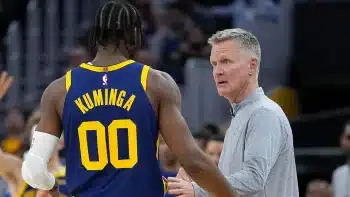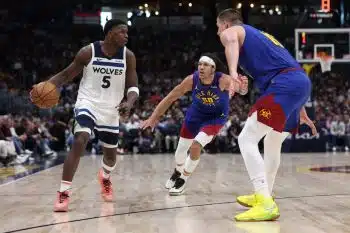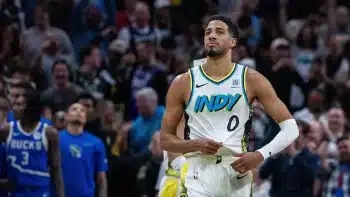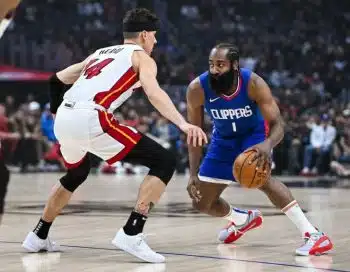NBA
NBA Daily: Is Stephen Curry the MVP?
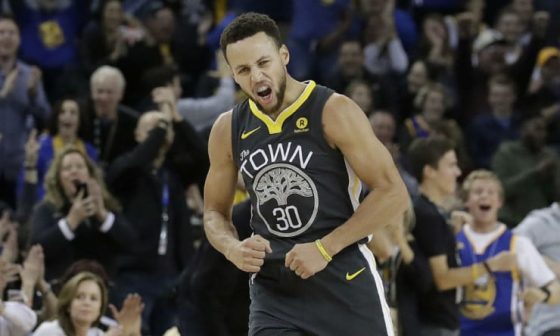
In the aftermath of Klay Thompson suffering an Achilles tear that ended his season before it began, no one would have blamed Stephen Curry for prioritizing his preservation through the 2020-21 campaign.
Instead, despite the Golden State Warriors lacking the necessary talent to become a title contender, Curry’s doing everything in his power to get them into the playoffs.
The two-time league MVP is on pace to win the scoring title for the second time in his career. In a recent road loss against the Boston Celtics, Curry put up 47 points, becoming the second player in Warriors history to score 30 or more points in 10-straight games, joining Wilt Chamberlain.
In his last 11 contests, Curry’s averaging 40 points on shooting splits that aren’t supposed to be possible at the game’s highest level. Even though he’s hoisting 14.3 attempts from beyond the arc per game, he’s making them at a 49.7 percent clip. He’s taking 23.4 shots from the field but still seeing the ball go through the hoop 54.1 percent of the time.
The context of how Curry’s producing those prodigious numbers makes them even more impressive. He is the only scoring threat on Golden State who defenses need to concern themselves with — stop Curry, win the game; it’s that simple, at least in theory it is.
Another layer of what makes Curry’s prolific scoring so impressive is the energy he’s exerting to do so. According to NBA.com’s tracking data, Curry’s running 1.43 miles per game on offense, which is the sixth-most league-wide. And what that figure doesn’t fully capture is that while Curry has a lightning-quick release and is masterful at creating the sliver of daylight he needs to get his shot off, it takes a significant amount of energy to do that once, let alone throughout a game.
Even though Curry’s already the greatest shooter of all time, he’s taken the most lethal part of his game to new heights. From 2015 when the Warriors won their first NBA championship to 2019, a stretch in which they reached the finals every year, step-back threes accounted for just eight percent of Curry’s shooting profile from beyond the arc. But this season, Curry knew it would be more challenging to create shots for himself, which is why he’s doubled that figure to 16 percent and he’s knocking down 51.5 percent of his step-back threes, per NBA.com.
Curry’s also putting more pressure on opponents from further away from the hoop than he has in years past. According to NBA.com, from 2015 through 2019, five percent of his threes came from 30 to 40 feet. This season, shots from that distance account for 10 percent of his three-point attempts. Just like when defenses double team him out of a pick-and-roll, Curry forcing teams to defend him from further out is another way for him to create 4-3 opportunities for his teammates.
After that loss against the Celtics, Warriors head coach Steve Kerr said Curry’s “at the peak of his powers.” Though he’s not just putting his talents towards individual production, he is the primary reason Golden State’s firmly in the play-in tournament. The Warriors currently reside ninth in the Western Conference. They’re one game behind the eighth-seeded Memphis Grizzlies and two back of the seventh-ranked Dallas Mavericks.
As impressive an individual season as Curry’s having and as vital as he’s been to his team’s success this season, the reality is the Warriors haven’t won at a high enough level for him to win Most Valuable Player honors for the third time in his career. Currently, Nikola Jokic is the leading MVP candidate. While it’s fair to point out the Denver Nuggets aren’t even in the top three in the Western Conference, Jokic ranks first in player efficiency rating, win shares, box plus/minus and value over replacement player. He’s averaging 26.4 points, 11.1 rebounds, 8.8 assists and 1.4 steals per game.
If Jokic misses enough of Denver’s remaining games, someone could usurp him for the right to win MVP. In that scenario, Curry would have a chance to become the NBA’s Most Valuable Player for a third time, but he’d have to sway voters from giving it to Joel Embiid. Embiid’s in the midst of a career season, ranking second in player efficiency rating, eighth in win shares and fourth in box plus/minus. He’s averaging 29.9 points, 11.2 rebounds and 1.4 blocks per game while leading the Philadelphia 76ers to the best record in the Eastern Conference.
Curry ranks sixth in player efficiency rating, seventh in win shares and is second in both box plus/minus and value over replacement player. He has a case for MVP, but Jokic and Embiid are capping off career seasons while leading their respective teams to a higher level of success. Yes, their teams are more talented and there probably isn’t enough weight put on how valuable an individual is to his team, but the reality is the MVP typically goes to the best player on a top team. Furthermore, that argument also applies to Jokic, who’s the lone All-Star on a team with a better record.
Not naming Curry this season’s Most Valuable Player doesn’t mean his prolific production isn’t appreciated. Nor should it get taken as a sign elevating his team, somehow finding ways to become a more dangerous shooter and investing as much energy as he has into a season that won’t end with a championship isn’t garnering respect from the NBA community. That includes fans whose favorite team doesn’t reside in the Bay Area.
